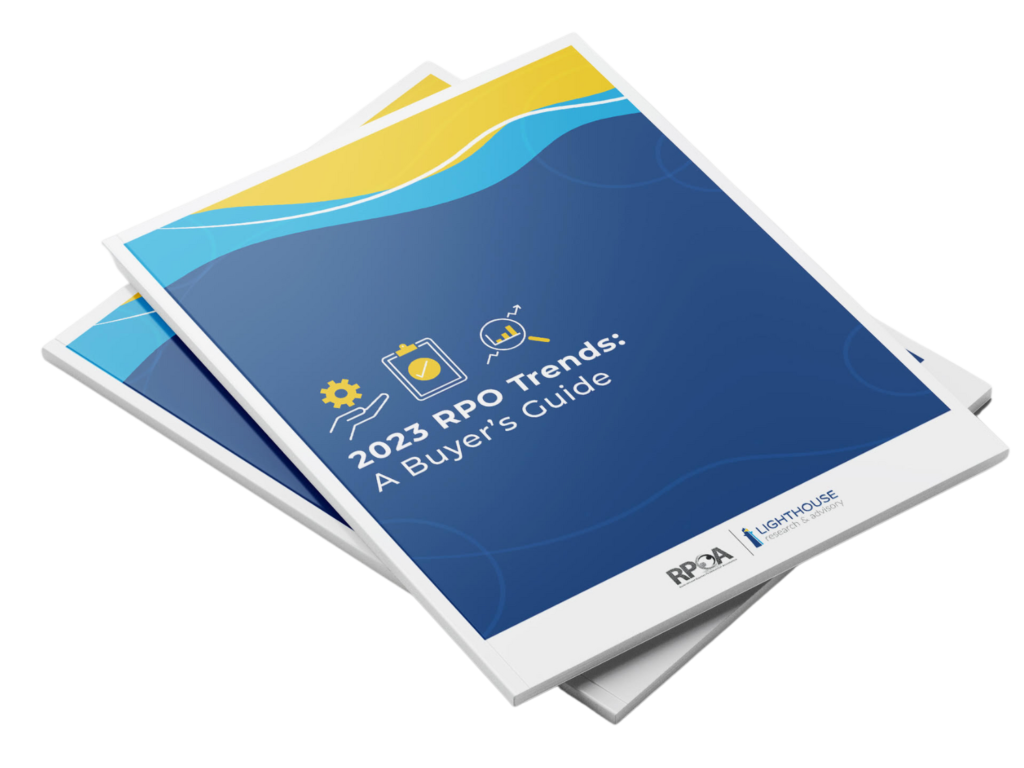RPO Buyer Study: Key Findings and Preferences [New Research]
Each year we partner with the RPO Association to produce a research study to examine and understand how the recruitment process outsourcing market is changing, what buyers expect, and the realities of the current landscape. Our latest report was recently released featuring findings from more than 500 RPO buyers, and it’s currently available at no charge. The video and other content below offer additional insight on what the report covers and what readers can expect.
In today’s environment, a significant number of conversations revolve around inflation, the economy, and the overall labor economics landscape. Since the publication of our previous RPO Trends report, we have seen some key markers adjust across the economy:
- Inflation has risen in fits and starts
- A potential recession hovers in a cloud of uncertainty
- Unemployment hangs at a historically low rate
- And the number of employers looking to hire has settled somewhat from the frenzied pace of 2021 and early 2022
Each of these items has led to a softening of the overall RPO market as employer demand for recruitment outsourcing has slowed in step with the overall reduction in hiring activity. This has driven RPO firms to consider other partnership options with employers that were less attractive in recent times, adjust pricing to be more conservative, and opening up to projects and pilots that weren’t possible in more competitive times.
As a current or potential buyer of RPO services, the report linked below is a guide designed to leverage research from 519 different organizations across the following areas:
- How they work with RPO partners and structure the relationships
- What services employers prefer from their RPO partners
- What value employers find in RPO relationships and how they measure it.
The research not only highlights what is happening right now, but it also provides some insight into how things have shifted over the last year, offering a helpful perspective for talent leaders who want to develop a modern, comprehensive talent strategy that incorporates the value RPO firms deliver.
Employers that are currently working with an RPO partner can use this as a guide to consider how their arrangement compares with those of other firms. Employers considering the usage of an RPO will find helpful data points to build a business case, ideas for how to get the most from an RPO partner, and insights for ways to structure the relationship to minimize risk and increase satisfaction. The data from the 1,000+ firms we have surveyed for this research over the last two years serves as the foundation for a brand new RPO Buyer Maturity Model featured within the report.
In addition, the video below highlights some key findings in an easy-to-understand way, making this relevant to both RPO buyers and RPO providers as well.
The recruitment process outsourcing (RPO) industry is witnessing a significant shift, reflecting deeper strategic needs and a focus on quality support. Lighthouse Research & Advisory’s latest insights paint a vivid picture of the evolving landscape of RPO buyer preferences and market trends.
At the forefront of this shift is a strong emphasis on alignment between overall hiring strategy and business objectives. In today’s dynamic business climate, organizations are recognizing the crucial role that RPO plays not just in filling positions, but in shaping the broader talent acquisition strategy that supports business growth and adaptation. This alignment ensures that the RPO partnership is not merely transactional, but a strategic enabler, deeply integrated with the company’s vision and goals.
Another notable change is in the criteria for selecting an RPO partner. This year, the quality of support has surged to become the biggest decision point, moving up three spots since 2022. This pivot highlights a growing recognition among businesses that effective RPO is not just about numbers and metrics; it’s about the quality, responsiveness, and reliability of the support they receive. Employers are seeking partners who can offer not just expertise, but a real understanding of their unique challenges and needs.
The demand for innovative recruiting strategies has also seen a remarkable 57% increase year over year. In an era where talent acquisition is more complex and competitive than ever, companies are looking for RPO partners who can bring fresh, creative approaches to attract and engage top talent.
Interestingly, about seven in ten employers are planning to change their RPO providers this year. This statistic underscores a significant level of dissatisfaction with current partnerships and a hunger for more aligned, supportive, and innovative RPO solutions.
In conclusion, the RPO industry is at a crossroads, with companies increasingly seeking partnerships that are not just efficient but also strategic and high in quality support. As the industry adapts to these evolving demands, the focus will likely continue to shift towards deeper alignment with business strategy, innovative recruiting approaches, and an unwavering commitment to quality in every aspect of service delivery. For organizations looking to stay ahead in the talent game, understanding and adapting to these trends will be key.

Ben Eubanks is the Chief Research Officer at Lighthouse Research & Advisory. He is an author, speaker, and researcher with a passion for telling stories and making complex topics easy to understand.
His latest book Talent Scarcity answers the question every business leader has asked in recent years: “Where are all the people, and how do we get them back to work?” It shares practical and strategic recruiting and retention ideas and case studies for every employer.
His first book, Artificial Intelligence for HR, is the world’s most-cited resource on AI applications for hiring, development, and employee experience.
Ben has more than 10 years of experience both as an HR/recruiting executive as well as a researcher on workplace topics. His work is practical, relevant, and valued by practitioners from F100 firms to SMB organizations across the globe.
He has spoken to tens of thousands of HR professionals across the globe and enjoys sharing about technology, talent practices, and more. His speaking credits include the SHRM Annual Conference, Seminarium International, PeopleMatters Dubai and India, and over 100 other notable events.

